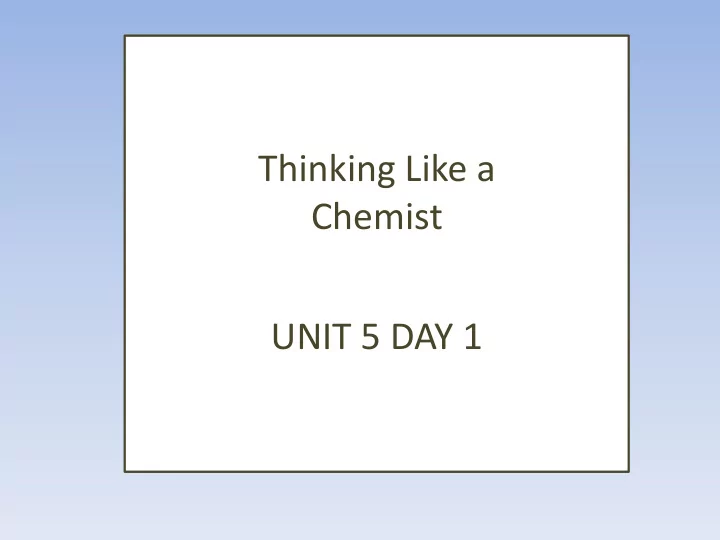

Thinking Like a Chemist UNIT 5 DAY 1
What are we going to learn today? Note some important details on the syllabus Become familiar with the course website Meet the teaching team Review the Mechanics of a Learner Centered Course Review the Concept of Thinking Like a Chemist in the context of a review of some material from last semester – Molecular Geometry IMFs Enthalpy, Entropy, Free Energy
ANNOUNCEMENTS LM01 – UNIT 5 LEARNING OUTCOMES LM02 – THERMODYNAMICS OF PHASE TRANSITIONS LM03 – REVIEW HEAT CURVE
Polling Question What class did you take for CH 301? A . Dr. Sparks class last fall B. Dr. Vanden Bout, Dr. LaBrake , or Dr. Crawford’s class last fall C. Another UT CH301 class last fall OR a CH301 class prior to last fall. D. CH301 (or its equivalent) at another college or university. E. I tested out of CH 301.
Polling Question What does the phrase “Think Like a Chemist” mean to you? A . I want to run out of this class now, I’m not a chemistry major, I just need this class for my major. B. To think like a Chemist C. Simultaneously make a macroscopic observation, while thinking in terms of the microscopic (molecular) models which can explain said observation. D. Because you have memorized all the formulas (both chemical and mathematical) that can be used to solve any chemistry problem, you can Think like a General Chemistry teacher type of chemist. E.This is a trick question, for those of us who did not have these instructors last semester.
What is a Learner Centered Course? What does the phrase “Think Like a Chemist” mean to you? http://www.youtube.com/watch?v=ovbn_J-XqQE
Class Activity
Polling Question Which has a higher Enthalpy? A. liquid water B. gaseous water C. they are exactly the same D. it depends on the temperature
Why do different phases have different Enthalpies? Intermolecular Forces (IMF) Liquid Molecules Close Together Intermolecular Forces are Attractive Lower enthalpy (energy) compared to molecules that are separated Gas Molecules Very far apart essentially no interactions no IMF = higher energy Enthalpy
Polling Question What is the sign for the enthalpy of vaporization, ∆ H vap ° ? A. positive B. negative C. zero
Comparing the two Attractive IMF ~ No IMF Lower H Higher H We need to put in energy to overcome the molecules attractions for each other ΔH vaporization = H gas - H liquid > 0 remember: positive change in enthalpy is energy into the system
Polling Question Comparing isopropanol and acetone, which has the greater ΔH vap ? A. Impossible to say without some data. B. isopropanol C. acetone D. They are the same. E. Will vary with temperature
What did we learn just now? Enthalpy is related to the “energy” of a substance. Liquids have a lower enthalpy (lower energy = more stable) because they are electrostatically attracted to other molecules and thus have a lower energy when they are close together The stronger the IMFs, the bigger the difference between the liquid and the gas (which has essentially no potential energy since the “molecules” are so far apart)
Polling Question Which has a higher Entropy? A. liquid water B. gaseous water C. they are exactly the same D. it depends on the temperature
A Quick Review of Entropy The entropy technically depends on the number of equivalent microstates of a system. How to deal with this qualitatively today? Entropy increases with: Increasing volume Increasing temperature Increasing number of molecules Going from a solid to a liquid to a gas The Universe tends towards higher entropy
Polling Question Comparing isopropanol and acetone, which has the greater ΔS vap ? A. Impossible to say without some data. B. isopropanol C. acetone D. They are about the same. E. Will vary with temperature
What did we learn just now? Gases always have a higher entropy than liquids. This is predominately due to the phase change (not the nature of the molecules). For almost every compound the difference in entropy between the liquid and the gas is the same.
What did we learn today? Differences in enthalpies of vaporization for different compounds depend on their IMF (and thus their molecule structure). Stronger IMF = larger enthalpies of vaporization Entropies of vaporization are very similar for most compounds At equilibrium ΔG = 0, and ΔH = TΔS Therefore, difference in boiling point result from differences in IMF. Stronger IMF = bigger ΔH = higher T.
Recommend
More recommend